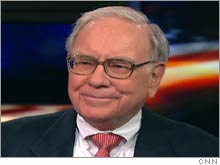|
Buffett: caution ahead
The Oracle of Omaha sees modest growth for stocks and sounds off on executive pay. Plus: The latest value of Buffett's biggest holdings.
NEW YORK (CNNMoney.com) - In his annual letter to Berkshire Hathaway shareholders, released Saturday, billionaire investor Warren Buffett said he made few changes to the company's stock holdings but cautioned investors that the portfolio's returns may be modest over the next several years. Buffett said while the company stands by its major holdings -- all "strong, highly-profitable businesses" -- current valuations aren't cheap. He said the group may double in value over the next 10 years with average annual per-share earnings gains of between 6 percent and 8 percent. Stock values, he said, will likely match that growth.
As for the overall stock market, Buffett braces investors for more modest returns to come, citing increased "frictional" costs that eat away at performance. These include costs related to trading, advice and money management. "These costs are now being incurred in amounts that will cause shareholders to earn far less than they historically have," writes Buffett. Berkshire Hathaway (Research) added Wal-Mart (Research) and Anheuser-Busch (Research) to its portfolio and increased its holdings in Wells Fargo (Research), a company that Wells Fargo chief executive Dick Kovacevich "runs brilliantly," Buffett said. Also new to the company's list of top holdings are Ameriprise Financial, a spin-off of American Express, and Procter & Gamble (Research), which merged with Gillette last year. (See table below.) Cautious on insurance
Looking ahead at Berkshire's insurance business, Buffett was cautious about the outlook for increasingly severe hurricanes in the coming years after the company lost $3.4 billion in 2005 as a result of Hurricanes Katrina, Rita and Wilma. To insulate the company from further losses, Buffett said Berkshire Hathaway will "now write mega-(catastrophe) policies only at prices far higher than prevailed last year and then only with an aggregate exposure that would not cause distress" if unusually strong hurricanes continue to hammer the region. That's a move that's been echoed in the wider insurance industry with large players, such as Allstate, looking to curb exposure and raise rates for their homeowner's insurance on the expectation that hurricanes will increase in frequency and severity for years to come. Another tricky area for the company is its exposure to General Re's derivatives business. In the last year, the company's pullout from the business cost Berkshire Hathaway $104 million pre-tax, bringing the company's aggregate losses from exiting the derivatives operations to $404 million. "The hard fact is that I have cost you a lot of money by not moving immediately to close down Gen Re's trading operations," he wrote to investors. "I failed in my attempt to exit painlessly and in the meantime more trades were put on the books. Fault me for dithering." He said derivatives in some circumstances could cause markets to become "chaotic" and Berkshire's experience with the business should be used as an instructional tool for managers, auditors and regulators. Sounding off on executive compensation
Buffett also sounded off on the increasing abuses surrounding executive compensation, but defended Gillette's former chief executive Jim Kilts' hefty compensation package -- worth over $150 million -- after the company sold itself to Procter & Gamble in a deal valued at $57 billion. He said Kilts turned the company around since taking the top job at Gillette in 2001 as he "instilled fiscal discipline, tightened operations and energized marketing, moves that dramatically increased the intrinsic value of the company." Buffett added that "Jim was paid very well -- but he earned every penny." While he defended Kilts' compensation, Buffett was less kind about the overall state of executive compensation in the United States, saying it was "ridiculously out of line with performance," a fact that's unlikely to change in the current environment.
He said corporations should pay their CEOs relative to performance but added that CEOs today can receive a bigger payout for being fired than "an American worker earns in a lifetime of cleaning toilets."
|
| |||||||||||||||||||||||||||||||||||||||||||||||||||||||||||||||||||

